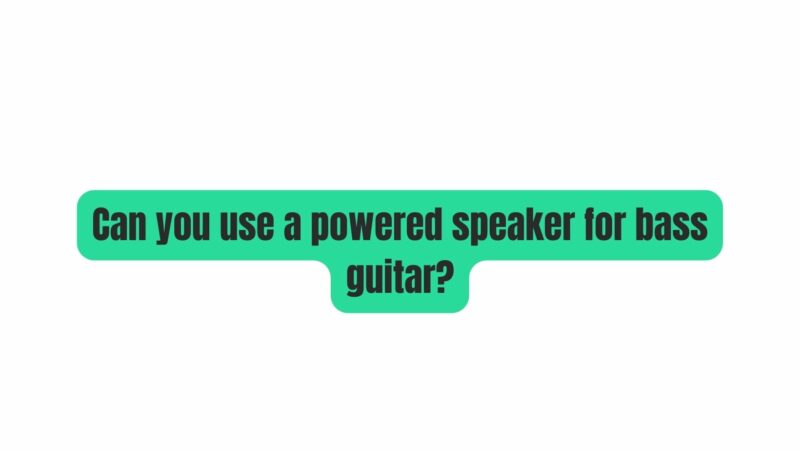Bass guitarists often seek versatile and efficient solutions for amplifying their instruments, and one question that frequently arises is whether you can use a powered speaker as a bass amp. In this comprehensive guide, we will explore the feasibility, advantages, limitations, and considerations of using a powered speaker for bass guitar amplification.
Understanding Powered Speakers
Before discussing the use of powered speakers for bass guitar, it’s essential to understand what powered speakers are and how they work:
- Powered Speakers (Active Speakers): Powered speakers, also known as active speakers, are self-contained audio systems that include a built-in amplifier. These speakers are designed to receive an audio signal and amplify it, eliminating the need for external amplifiers or receivers. Powered speakers are commonly used in various applications, including live sound reinforcement, studio monitoring, and portable audio setups.
Using a Powered Speaker for Bass Guitar
Can you use a powered speaker for bass guitar amplification? Yes, it is possible, but there are important factors and considerations to keep in mind:
- Power Handling: The power handling capacity of the powered speaker is crucial when using it for bass guitar. Bass frequencies demand more power to reproduce accurately, so ensure that the speaker can handle the wattage produced by your bass amplifier. Exceeding the speaker’s power rating can result in damage.
- Speaker Size: The size of the speaker driver (woofer) matters significantly. Larger woofers, such as 12-inch, 15-inch, or 18-inch drivers, can move more air and reproduce lower frequencies more effectively. Smaller speakers with 8-inch or 10-inch woofers may not provide sufficient low-end response.
- Frequency Response: Check the frequency response specifications of the powered speaker. Bass guitars produce frequencies that extend into the low-frequency range, typically starting at around 41 Hz (E1). Ensure that the speaker’s frequency response can adequately reproduce these low frequencies for a satisfying bass tone.
- Portability: Powered speakers are often chosen for their portability. If you need a portable bass solution for practices, gigs, or events, a powered speaker can be a convenient option.
- Bass Guitar vs. Bass-Heavy Music: Consider whether you’re using the powered speaker for a bass guitar or transmitting bass-heavy music through it. While a powered speaker can handle both, the settings and EQ adjustments may vary to optimize the sound.
- EQ and Sound Shaping: Many powered speakers offer EQ controls or presets to tailor the sound. Experiment with these settings to achieve the desired bass response and overall sound quality.
- Additional Gear: Depending on your setup, you may need additional gear such as a preamp, mixer, or effects pedals to fine-tune your bass tone before sending it to the powered speaker.
Advantages of Using a Powered Speaker for Bass Guitar
Using a powered speaker for bass guitar amplification offers several advantages:
- Portability: Powered speakers are often lightweight and designed for easy transport, making them suitable for on-the-go musicians.
- Versatility: A powered speaker can serve multiple purposes, allowing you to use it for different instruments or audio sources.
- Simplified Setup: With a powered speaker, you eliminate the need for an external amplifier, simplifying your setup and reducing the number of components to carry.
- Cost-Efficiency: If you already own a powered speaker, using it for bass guitar amplification can save you money compared to purchasing a separate bass amp.
Considerations and Limitations
While using a powered speaker for bass guitar amplification can be practical, there are important considerations and limitations:
- Sound Quality: Dedicated bass amplifiers are designed to provide optimal sound quality and tone shaping for bass frequencies. Powered speakers may not offer the same level of bass clarity and warmth.
- Power Handling: Ensure that the powered speaker can handle the power output of your bass amplifier without distortion or damage.
- Tone Shaping: Bass amplifiers often include specialized EQ controls for shaping the bass tone. Powered speakers may have a more general EQ, which can limit your ability to fine-tune your bass sound.
- Volume and Projection: Powered speakers may not project bass frequencies as effectively as dedicated bass amps, especially in larger venues.
Conclusion
In conclusion, using a powered speaker for bass guitar amplification is possible and can be a practical choice for various applications, from practice sessions to small gigs. However, it’s crucial to choose a powered speaker with the right power handling, speaker size, and frequency response to ensure optimal bass performance. Additionally, experimenting with EQ settings and considering your specific use case will help you achieve the best possible bass sound through a powered speaker. Whether you’re a bassist on the go or a musician seeking a portable solution, a well-chosen powered speaker can deliver impressive bass tones and make your music sound its best.


